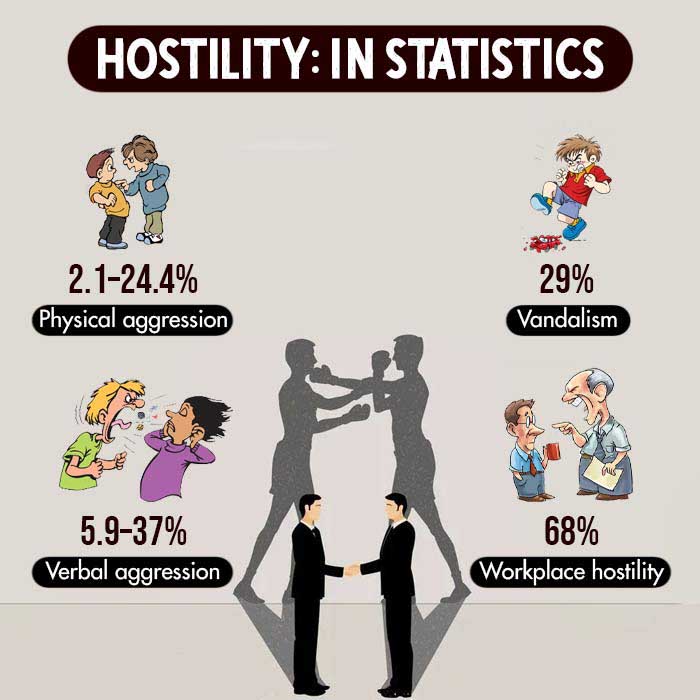Hostility is a complex emotion associated with anger and aggression, which can be triggered by various factors such as insecurity, past trauma, or environmental factors. Though it’s a natural response to threats, it can have negative consequences for individuals and their surroundings. Understanding its causes and effects is vital for promoting healthy communication and building positive relationships.
What Is Hostility?
Hostility involves a negative situation marked by enmity, deep-seated hatred, opposition, and ill will. In psychology, it is considered an innate personality trait 1 Orbell, S., Schneider, H., Esbitt, S., Gonzalez, J. S., Gonzalez, J. S., Shreck, E., Batchelder, A., Gidron, Y., Pressman, S. D., Hooker, E. D., Wiebe, D. J., Rinehart, D., Hayman, L. L., Meneghini, L., Kikuchi, H., Kikuchi, H., Desouky, T. F., McAndrew, L. M., Mora, P. A., & Bruce, B. (2013). Hostility. Encyclopedia of Behavioral Medicine, 989–993. https://doi.org/10.1007/978-1-4419-1005-9_254 marked by anger, unfriendliness, resentment, disapproval, alienation, and even violence directed at others.
An individual turns hostile when he/she undergoes the transition from cognitive hostility (aggressive motivation) to behavioral aggressiveness 2 Perlini, C., Bellani, M., Besteher, B., Nenadić, I., & Brambilla, P. (2018). The neural basis of hostility-related dimensions in schizophrenia. Epidemiology and psychiatric sciences, 27(6), 546–551. https://doi.org/10.1017/S2045796018000525 (aggressive actions). Hostile behavior is often associated with negative emotions during interpersonal interactions, lack of compliance with rules, social isolation and poor social functioning, and low quality of life.
What Is A Hostile Personality?
A personality or cognitive trait 3 Nabi, H., Consoli, S. M., Chiron, M., Lafont, S., Chastang, J. F., Zins, M., & Lagarde, E. (2006). Aggressive/hostile personality traits and injury accidents: an eight-year prospective study of a large cohort of French employees — the GAZEL cohort. Psychological medicine, 36(3), 365–373. https://doi.org/10.1017/S0033291705006562 characterized by cynicism, mistrust, negative beliefs, and aggressiveness concerning others is often defined as a hostile personality.
People with type A personalities have predominant traits of hostility, impatience, and anger. Moreover, individuals with the Dark Triad personality traits of narcissism, Machiavellianism, and psychopathy often engage in wilful hostile behavior 4 Del Vecchio, T. (2011). Instrumental Aggression. Encyclopedia of Child Behavior and Development, 823–824. https://doi.org/10.1007/978-0-387-79061-9_1510 , without provocation, to obtain a negative outcome or coerce others. A hostile personality often engages in:
- Malevolent creativity 5 Perchtold-Stefan, C. M., Fink, A., Rominger, C., & Papousek, I. (2021). Creative, Antagonistic, and Angry? Exploring the Roots of Malevolent Creativity with a Real-World Idea Generation Task. The Journal of creative behavior, 55(3), 710–722. https://doi.org/10.1002/jocb.484
- Verbal aggression
- Physical aggression
- Emotional aggression (involving emotional outbursts, abuse, and manipulation)
- Vandalism
- Cruelty towards animals
- Bullying or threatening behavior
- Arson
- Truancy

Anger Vs Hostility
Hostility and anger are direct expressions of negative emotional arousal and unchecked aggression. These emotions are also related. Anger issues can trigger hostility and instrumental aggression like intentionally hurting someone by violence, malicious gossiping, rumor spreading, etc. The two terms are often used synonymously, but they are not the same 6 Tsikandilakis, M., Bali, P., Derrfuss, J., & Chapman, P. (2019). Anger and hostility: are they different? An analytical exploration of facial-expressive differences, and physiological and facial-emotional responses. Cognition and Emotion, 34(3), 581–595. https://doi.org/10.1080/02699931.2019.1664415 .
Anger is a basic emotion 7 Williams R. (2017). Anger as a Basic Emotion and Its Role in Personality Building and Pathological Growth: The Neuroscientific, Developmental and Clinical Perspectives. Frontiers in psychology, 8, 1950. https://doi.org/10.3389/fpsyg.2017.01950 and a strong feeling of displeasure and antagonism aroused by a wrong. It can be either positive or negative. Hostility, on the other hand, is a personality trait characterized by disapproval, hate, and ill will toward others. It has a negative relationship with positive psychosocial development.
What Is The Root Of Hostility Toward Others?
Research attributes the development of hostility 8 Arehart-Treichel, J. (2003). Understanding Roots of Hostility Could Divert Its Expression. Psychiatric News, 38(5), 37–37. https://doi.org/10.1176/pn.38.5.0037 toward others to a number of factors, namely:
- Personality traits (like type A personality, a desire for obsessive control, narcissism, etc.)
- Untreated trauma
- Experiences of childhood abuse
- Parental abuse, neglect, and abandonment
- Exposure to domestic violence and aggression
- Brain injury
- Neurological disorders (like epilepsy, autism, etc.)
- Mental health disorders (like conduct disorders, addictive disorders, etc.)
- Psychosocial environment related to poverty, peer delinquency, etc.
Read More About Conduct Disorder Here
What Does Hostile Mean In Mental Health?
Hostility in itself does not qualify as an independent and diagnosable clinical condition. Instead, “hostility in mental health” means displaying hostile or aggressive behavior as a symptom 9 Weiss, J. W., Mouttapa, M., Cen, S., Johnson, C. A., & Unger, J. (2011). Longitudinal effects of hostility, depression, and bullying on adolescent smoking initiation. The Journal of adolescent health : official publication of the Society for Adolescent Medicine, 48(6), 591–596. https://doi.org/10.1016/j.jadohealth.2010.09.012 of mental health conditions (like anxiety), stress vulnerability, maladaptive coping strategies, as well as internalizing and externalizing behaviors such as bullying, etc.
Read More About Bullying Here
What Mental Illness Causes Hostility?
Certain mental health disorders involve dysfunctional thoughts and behavior as major symptoms. These conditions, particularly behavioral and conduct disorders 10 Lemogne, C., Fossati, P., Limosin, F., Nabi, H., Encrenaz, G., Bonenfant, S., & Consoli, S. M. (2011). Cognitive hostility and suicide. Acta psychiatrica Scandinavica, 124(1), 62–69. https://doi.org/10.1111/j.1600-0447.2010.01658.x , are marked by frequent and persistent impulsive anger outbursts or physical aggression.
In fact, a common contributor to the misconception of the mentally ill as “dangerous people” involves this behavioral disturbance 11 Faay, M. D. M., van Os, J., & Genetic Risk and Outcome of Psychosis (GROUP) Investigators (2020). Aggressive Behavior, Hostility, and Associated Care Needs in Patients With Psychotic Disorders: A 6-Year Follow-Up Study. Frontiers in psychiatry, 10, 934. https://doi.org/10.3389/fpsyt.2019.00934 that threatens the safety of others around them.
Mental health conditions 12 Fernandez, E., & Johnson, S. L. (2016). Anger in psychological disorders: Prevalence, presentation, etiology and prognostic implications. Clinical psychology review, 46, 124–135. https://doi.org/10.1016/j.cpr.2016.04.012 with symptomatic hostile behavior include:
- Intermittent explosive disorder (IED)
- Borderline personality disorder (BPD) [Read more]
- Oppositional defiant disorder (ODD) [Read more]
- Attention-deficit hyperactivity disorder (ADHD) [Read more]
- Mood disorders (like depression, bipolar disorders, etc.) [Read more]
- Stress disorders (like PTSD) [Read more]
- Psychotic disorders
- Schizoaffective disorders
- Personality disorders (like psychopathy, antisocial personality disorder, dissociative identity disorder (DID), etc.) [Read more]
- Substance use disorders
- Addictive disorders (like alcoholism, gambling disorder, etc.)
How Does Hostility Impact Mental Health?
Hostility can affect mental health in several ways, as it often triggers:
- Intense stress reactions
- High levels of anger, irritability, and aggression
- Intense resentment
- Social isolation
- Difficulties in forming and maintaining healthy relationships
- Impaired coping skills
- Limitations in executive functioning
- Reduced quality of life
- Various mental health issues, including anxiety disorders, depressive disorders, etc.
Read More About Gambling Disorder Here
Addressing One’s Own Hostile Behavior
Consider the following self-help measures 13 Mao, W. C., Bardwell, W. A., Major, J. M., & Dimsdale, J. E. (2003). Coping strategies, hostility, and depressive symptoms: a path model. International journal of behavioral medicine, 10(4), 331–342. https://doi.org/10.1207/s15327558ijbm1004_4 to address your hostility and anger issues:
- Acknowledge that you have behavioral problems and anger issues.
- Consider availing therapy to address your hostile traits.
- Recognize the triggers that make you hostile. Come up with a plan to manage them better.
- Consider handling hostile situations with an empathetic, non-judgmental, and flexible approach.
- Practice calming yourself in confrontational situations. Think before you speak, express your concerns politely, and try to work out a solution.
- Stop holding grudges and practice “letting go” of matters that immediately trigger hostility and anger.
- Most often, anger issues arise as a fight-or-flight stress response. Maintain a healthy diet and get quality sleep to reduce stress. Take some time out of your busy schedule to rest and rejuvenate.
- Avail relaxation and mindfulness techniques (like meditation and yoga) that can help you become more psychologically resilient.
How Do You Deal With A Hostile Person?
Dealing with a confrontational and hostile individual can be quite challenging. Such an individual can be a loved one in your personal circle or a peer in a professional environment. However, certain tips can help you manage such difficult situations and turn his/her hostility into an amicable working relationship.
- Keep a safe distance while negotiating with the hostile person. Seek help and support if necessary.
- De-personalize or undervalue the situation. This can help you handle the aggressor with more detachment.
- Try shifting from reactive to proactive. Consider understanding the viewpoint of the aggressor. While empathy cannot excuse aggressive behavior, it can provide you with insights for better management of the situation.
- Utilize assertive and effective statements while addressing the aggressor. Firmly maintain your stance against his/her threatening behavior.
- Take action if the aggressor is violating your boundaries. This will help you to not only firmly control the hostile circumstances but also compel respect and cooperation from the aggressor.
- If you are not comfortable dealing with the situation, consider leaving behind the conflict and ties with the hostile person.
- When you cannot get engaged with the person, create and maintain safe boundaries. Keep your cool and avoid escalation.
- If the aggressor is a loved one, consider recommending medical interventions for his/her hostile behavior and anger issues. Help him/her avail therapy and provide support throughout the treatment and recovery process.
Takeaway
Situations involving aggression, hostility, and anger are uncomfortable ones. Operating inside them can be detrimental to our mental and physical health. Moreover, aggressive behavior resulting from undiagnosed mental health conditions can create difficulties in personal and professional lives. Therefore, addressing issues related to cognitive and behavioral hostility, as early as possible, can help us lead happier, more fulfilling lives.
At A Glance
- Hostility is a negative condition marked by enmity, hatred, opposition, and ill will.
- It is considered a temperamental trait in the type A and the Dark Triad personalities.
- Hostile behavior is associated with a low quality of life and poor social relationships.
- Hostility is also a symptom of certain untreated mental health conditions.
- Hostile behavior can be corrected by self-help strategies and therapies.
Frequently Asked Questions (FAQs)
1. Is hostility a psychological factor?
Hostility is a cognitive or personality trait characterized by a negative attitude toward others.
2. What is hostile aggression?
Hostile aggression is a type of aggression committed in response to a perceived threat or insult. It is often considered an unplanned, reactionary, and impulsive action.
3. Is type A personality considered hostile?
People with type A personality tend to be easily aroused by anger or hostility.
4. Is hostility a personality trait?
Hostility is largely considered a stable personality trait accompanied by frequent feelings of anger, aggressive behavior, and cynicism.
5. What is a hostility disorder?
Hostility in itself does not qualify as an independent and diagnosable clinical condition. It is a symptom of certain psychological conditions. Therefore, there is no such thing as “hostility disorder”.
6. How do you cure hostility?
You can manage your hostile behavior with a number of therapies and self-help coping techniques. Recognizing that you have hostility and anger issues, working on your anger management can be a good place to start.















